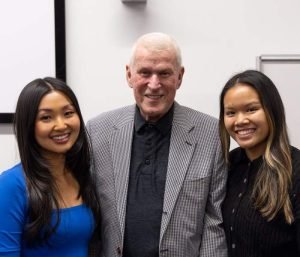"My lived experiences helped me understand how difficult it is to access culturally competent and equitable health care...I knew that I wanted to pursue an MHA so that I could become a leader in this space and advocate for health justice."
Where did you grow up? Where did you attend undergrad and what was your degree/area of study?
[Gina] I was born in Taipei, Taiwan, and my family immigrated to rural Texas when I was very young. I spent twelve years in Texas before moving to Albuquerque, New Mexico, and stayed there for undergrad. I completed my bachelor’s in population health and women’s studies at the University of New Mexico.
What drew you to public health?

[Gina] My lived experiences helped me understand how difficult it is to access culturally competent and equitable health care. After completing undergrad, I worked as a community health worker for Presbyterian Healthcare for two years, which overlapped with the COVID-19 pandemic. I connected individuals in need to community services that could support them, like getting them affordable housing applications or helping them find food pantries. That experience amplified my desire to work with underserved populations, especially after seeing how health disparities were made so much worse during the pandemic for communities of color. I knew that I wanted to pursue an MHA so that I could become a leader in this space and advocate for health justice.
Are you currently involved in any public health research or professional work?
[Gina] I am currently employed as an administrative resident at HealthPartners Methodist Hospital within the hospital medicine department. In this role, I support departmental tasks such as physician scheduling or implementing new initiatives such as Interdisciplinary Care Rounds.
I also serve as a research assistant for the College of Continuing and Professional Studies’ Health Services Management (HSM) Program. I am currently working with Frances Fernandez, the Faculty Director of HSM. I support their work on the Writing-Enriched Curriculum HSM plan, ensuring that project deliverables are met.
Why did you choose to come to the U of M School of Public Health?
[Gina] In my initial application process, I wasn’t considering moving to the Midwest. But I was looking through the rankings and ended up applying to U of M SPH the day before the applications closed because I saw how highly ranked the MHA program was. Then after getting accepted, I was offered a really great scholarship here, which was a huge deciding factor. In addition to that scholarship, I ended up choosing U of M SPH because of our impressive record of creating strong healthcare professionals and leaders, our #2 MHA ranking in the nation, and our extensive alumni network.
What are you most excited about in our Strategic Plan for Antiracism?
[Gina] I am particularly interested in the second goal area, focused on students. As a student myself, I understand the importance and value of cultivating a safe, inclusive environment, especially for my BIPOC peers and classmates. I also appreciate our school’s explicit focus on antiracism. I feel like “DEI” has been overused by corporations and has lost some of its meaning. Many organizations just put up a DEI statement on their website to say, “we care,” with no tangible actions to back it up.

But us calling out antiracism is specific and action-oriented. Words matter, and naming racism and what we’re doing to address it is powerful.
What do you like to do when you’re not in class?
[Gina] I really enjoy weight lifting, cooking, and traveling. My favorite place to visit is Taiwan, because I can connect with my family and culture. There are also incredible night markets and street food!
What are your plans after graduation?
[Gina] I recently accepted a fellowship with Kaiser Permanente, so I will be moving to California upon graduation. I couldn’t have gotten that fellowship without the school or the folks in the MHA program! The name recognition of our program, in addition to connections with places like Kaiser, really made a difference.

